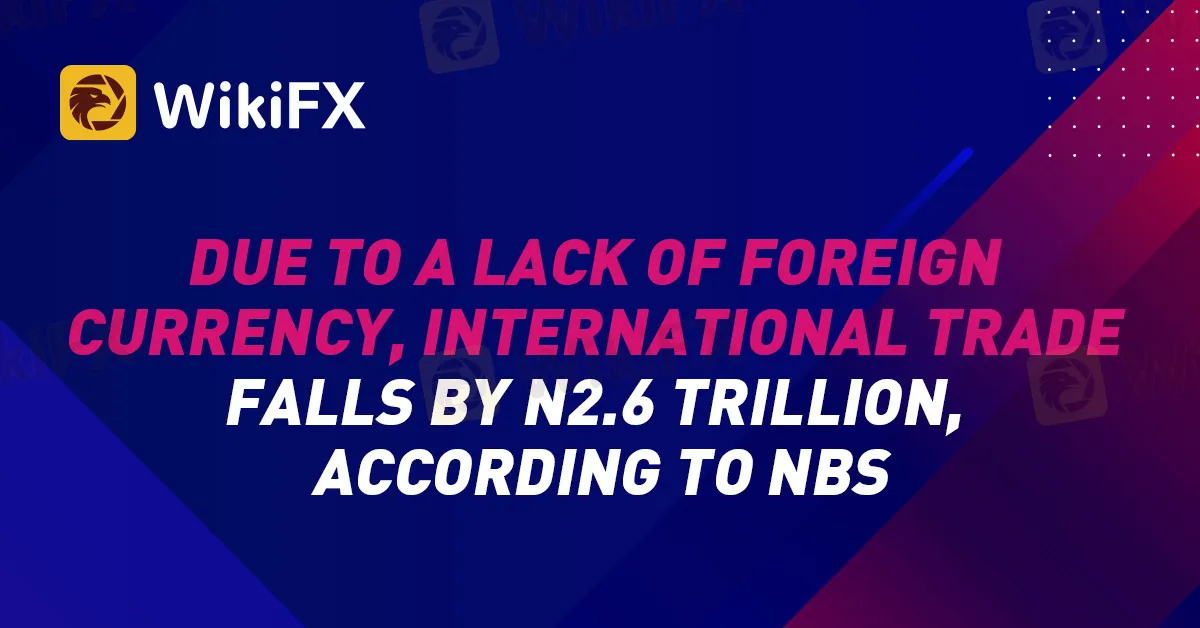简体中文
繁體中文
English
Pусский
日本語
ภาษาไทย
Tiếng Việt
Bahasa Indonesia
Español
हिन्दी
Filippiiniläinen
Français
Deutsch
Português
Türkçe
한국어
العربية
DUE TO A LACK OF FOREIGN CURRENCY, INTERNATIONAL TRADE FALLS BY N2.6 TRILLION, ACCORDING TO NBS
Abstract:According to research, the value of international commerce has decreased overall by N2.55 trillion as a result of decreasing exports from Nigeria over the past year.

According to research, the value of international commerce has decreased overall by N2.55 trillion as a result of decreasing exports from Nigeria over the past year.
According to the National Bureau of Statistics' latest report on foreign trade statistics, the overall value of trade dropped from N14.6 trillion in the first quarter of 2022 to N12.05 trillion in Q1 2023.
Nigeria imported $5.56 trillion and exported $6.49 trillion in Q1 2023, demonstrating a trade surplus of $930 billion, the research states.
The report stated, “The value of total imports stood at N5.56tn in the first quarter of 2023, this represents a 3.67 per cent rise when compared with the value recorded in Q4, 2022 (N5.36tn), but declined by 25.83 per cent compared to the value recorded in the corresponding quarter of 2022 (N7.5tn).”
The value of imports and exports decreased, according to the data.
Exports dropped from N7.1 trillion in Q1 2022 to N6.49 trillion in Q1 2023, an 8.66% reduction in value.
As stated in the study, “The value of total exports in Q1, 2023 stood at N6.49tn indicating an increase of 2.00 per cent when compared with the value of exports in Q4, 2022 (N6.36tn), but decreased by 8.66 per cent when compared with the first quarter of 2022 (N7.10tn).”
Additionally, it was revealed that exports of manufactured goods, crude oil, oil products, energy goods, and raw materials items decreased in the first quarter of 2023.
Only the export of solid minerals and agricultural products saw growth, at 38.72 and 32.17 percent, respectively.
“The value of agricultural goods exports stood at N279.64 billion in Q1, 2023,” the report stated. “This shows an increase of 63.92 percent and 38.72 percent compared to the value recorded in Q4, 2022 (N170.59 billion) and Q1, 2022 (N201.59 billion),” it continued.
“The value of solid minerals exports in Q1 2023 was valued at N26.02 billion, indicating an increase of 23.73 percent and 32.17 percent compared to the value recorded in Q4 2022 (N21.03 billion) and in the corresponding quarter in 2022 (N19.69 billion), respectively,” it continued.
Forex shortage is to blame
The lack of access to foreign currency, the scarcity of local raw materials, and rising energy costs are just a few of the many difficulties local manufacturers face, according to Gabriel Idahosa, the deputy president of the Lagos Chamber of Commerce and Industry, which has played a significant role in preventing the manufacturing sector from reaching its full potential.
According to Idahosa, The manufacturing sector's performance is being impacted by a number of significant driving forces. Our manufacturing is heavily reliant on the importation of raw materials. Many of them struggle with more than just normal FX access. Since many of them are among the 41 commodities that CBN has blacklisted, they are completely dependent on the parallel market, where, as you are aware, the cost of foreign exchange is rising.
Similar concerns were repeated by Olusola Obadimu, Director-General of the Nigerian Association of Chambers of Commerce, Industry, Mines, and Agriculture. He claims that despite the struggling status of the industrial sector, the statistics body's data looks to be somewhat erroneous due to the large number of unauthorized exports that go unrecorded.
In a similar vein, Dr. Muda Yusuf, CEO of the Centre for the Promotion of Private Enterprise, highlighted that exports of manufactured goods to other nations have remained historically low as a result of the deluge of problems plaguing the manufacturing industry.

Disclaimer:
The views in this article only represent the author's personal views, and do not constitute investment advice on this platform. This platform does not guarantee the accuracy, completeness and timeliness of the information in the article, and will not be liable for any loss caused by the use of or reliance on the information in the article.
Read more

Malaysian-Thai Fraud Syndicate Dismantled, Millions in Losses Reported
The Royal Malaysia Police (PDRM) has received 26 reports concerning the Nicshare and CommonApps investment schemes, both linked to a major fraudulent syndicate led by a Malaysian citizen. The syndicate’s activities came to light following the arrest of its leader by Thai authorities on 16 December.

WikiFX Review: Is FxPro Reliable?
Founded in 2006, FxPro is a reputable UK-based broker, trading on various market instruments. In this article, we will help you find the answer to one question: Is FxPro reliable?

Geopolitical Events: What They Are & Their Impact?
You've heard many times that geopolitical events have a significant impact on the Forex market. But do you know what geopolitical events are and how they affect the FX market? Let us learn about it today.

Why Do You Feel Scared During Trade Execution?
Trade execution is a pivotal moment for traders. It is when analysis turns into action, and potential profits or losses become reality. However, for many traders, this moment is accompanied by fear. Why does this happen, and how can you address it?
WikiFX Broker
Latest News
ASIC Sues Binance Australia Derivatives for Misclassifying Retail Clients
Geopolitical Events: What They Are & Their Impact?
Top 10 Trading Indicators Every Forex Trader Should Know
WikiFX Review: Is FxPro Reliable?
Malaysian-Thai Fraud Syndicate Dismantled, Millions in Losses Reported
Trading frauds topped the list of scams in India- Report Reveals
Why Do You Feel Scared During Trade Execution?
WikiFX Review: Something You Need to Know About Markets4you
Revolut Leads UK Neobanks in the Digital Banking Revolution
Fusion Markets: Safe Choice or Scam to Avoid?
Currency Calculator


